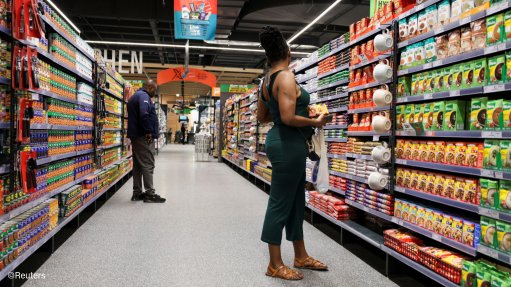Shifting trade dynamic presents Africa-China opportunities


SIMONE COOPER China’s demand for raw materials aligns with Africa’s resource-rich economies
Driven by its core vision to drive Africa’s growth, financial services provider Standard Bank’s initiatives aim to create meaningful trade linkages and unlock economic opportunities for African businesses, in particular, by leveraging recent developments to strengthen trade between the African continent and China.
Standard Bank views the shifting geopolitical and trade landscape, particularly the renewed US tariffs on Chinese goods, “as a profound realignment of global economic dynamics, with significant implications for Africa and emerging markets”, says Standard Bank Group business and commercial banking South Africa head Simone Cooper.
Standard Bank Group chief economist Goolam Ballim emphasises that the world is not simply fragmenting, but rather it is reorganising around new trade alignments that increasingly bypass traditional Western centres such as the US.
Ballim views South Africa’s G20 presidency as a pivotal moment for the continent, suggesting that Africa could help shape a new global consensus, particularly as the US distances itself from multilateralism.
“This aligns with Standard Bank’s broader strategy of deepening intra-African trade and leveraging platforms like the African Continental Free Trade Area (AfCFTA),” says Cooper.
She asserts that China remains a particularly strategic trade partner for African businesses in the current global climate owing to a combination of economic, geopolitical and infrastructural factors.
These factors include complementary economic needs, Chinese infrastructure capability, trade diversification amid global tensions, China’s large consumer market and strategic alignment with AfCFTA.
Cooper elaborates that China’s demand for raw materials, such as minerals, oil and agricultural products, aligns with Africa’s resource-rich economies while Africa’s need for infrastructure development and manufactured goods can be met by China’s industrial and engineering capacity, as well as its competitive pricing.
Further, as Western economies, such as the US and EU, adopt more protectionist policies, African countries are looking to diversify trade partnerships.
“China offers a large, stable market for African exports amid global supply chains shifting away from traditional Western hubs,” Cooper says.
Additionally, its large consumer base creates high demand for high-quality agricultural products, tourism and cultural exchange – sectors where Africa has untapped potential.
Moreover, China’s interest in aligning with AfCFTA, particularly in using Africa as a production and export hub for global markets, could shift Africa’s global role from being a raw materials supplier to a base for value-added manufacturing.
Accessing China’s Market
Recognising the importance of market access, Standard Bank offers its clients tailored support through its Africa-China Trade Solutions (ACTS) team. Strategically positioned, the ACTS team assists clients in navigating the complexities of entering the Chinese market.
ACTS provides a comprehensive suite of services, including facilitating cross-border payments and trade finance, offering guidance on regulatory compliance and market entry strategies, providing translation services and connecting clients with vetted trade partners in China.
The bank also assists clients in accessing market opportunities by facilitating participation in platforms such as the China-Africa Economic and Trade Expo (CAETE), the China International Import Expo, ProWine and business-to-business matchmaking sessions.
“These opportunities are made possible through our strategic partnership with the Industrial and Commercial Bank of China, enhancing client exposure and access to qualified buyers in China,” Cooper adds.
She highlights that CAETE, which took place in Changsha, in China’s Hunan province, between June 26 and 29, was instrumental in facilitating trade. In previous years, the expo’s impact facilitated several profitable export deals, including long-term agreements such as five-year trade deals for “iconic South African products”, including Rooibos tea, premium wines and high-quality macadamia nuts.
“These success stories highlight the growing demand for African goods and the strategic role Standard Bank plays in expanding market access for local exporters,” says Cooper.
To further ensure sustainable growth and market entrenchment, Standard Bank offers services ranging from assistance with China’s General Administration of Customs registration and other required product documentation to support for digital promotion of African products on leading Chinese e-commerce channels and end-to-end logistics solutions.
Further, the bank has developed resources to enhance market understanding when accessing a new market. Standard Bank’s ‘Guide to Exporting to China’ booklet outlines export requirements, regulatory considerations, Chinese market insights, business culture and payment methods to prepare businesses for events such as CAETE, Cooper explains.
Special Economic Zones
To further support trade expansion, Cooper points to the role of free trade zones as subcategories of special economic zones (SEZs). Typically located near key logistics hubs such as ports and airports, these zones provide valuable facilitation services for African importers and exporters, including reducing the cost of trading or minimising customs intervention.
Beyond trade efficiency, SEZs create an enabling environment for value-added production, skills development and export-led growth. These zones also facilitate access to global markets and supply chains, supporting the transition away from a reliance on traditional commodity exports to more diversified and industrialised trade portfolios.
Through targeted incentives such as tax breaks and improved infrastructure, SEZs attract domestic and foreign investment into strategic sectors. These incentives lower the cost of conducting business and streamline the establishment of operations.
“Multinationals from China have taken up residence in SEZs, establishing local manufacturing or assembly facilities. This has contributed significantly to economic development, job creation and skills transfer, within those communities,” Cooper concludes.
Article Enquiry
Email Article
Save Article
Feedback
To advertise email advertising@creamermedia.co.za or click here
Announcements
What's On
Subscribe to improve your user experience...
Option 1 (equivalent of R125 a month):
Receive a weekly copy of Creamer Media's Engineering News & Mining Weekly magazine
(print copy for those in South Africa and e-magazine for those outside of South Africa)
Receive daily email newsletters
Access to full search results
Access archive of magazine back copies
Access to Projects in Progress
Access to ONE Research Report of your choice in PDF format
Option 2 (equivalent of R375 a month):
All benefits from Option 1
PLUS
Access to Creamer Media's Research Channel Africa for ALL Research Reports, in PDF format, on various industrial and mining sectors
including Electricity; Water; Energy Transition; Hydrogen; Roads, Rail and Ports; Coal; Gold; Platinum; Battery Metals; etc.
Already a subscriber?
Forgotten your password?
Receive weekly copy of Creamer Media's Engineering News & Mining Weekly magazine (print copy for those in South Africa and e-magazine for those outside of South Africa)
➕
Recieve daily email newsletters
➕
Access to full search results
➕
Access archive of magazine back copies
➕
Access to Projects in Progress
➕
Access to ONE Research Report of your choice in PDF format
RESEARCH CHANNEL AFRICA
R4500 (equivalent of R375 a month)
SUBSCRIBEAll benefits from Option 1
➕
Access to Creamer Media's Research Channel Africa for ALL Research Reports on various industrial and mining sectors, in PDF format, including on:
Electricity
➕
Water
➕
Energy Transition
➕
Hydrogen
➕
Roads, Rail and Ports
➕
Coal
➕
Gold
➕
Platinum
➕
Battery Metals
➕
etc.
Receive all benefits from Option 1 or Option 2 delivered to numerous people at your company
➕
Multiple User names and Passwords for simultaneous log-ins
➕
Intranet integration access to all in your organisation



















